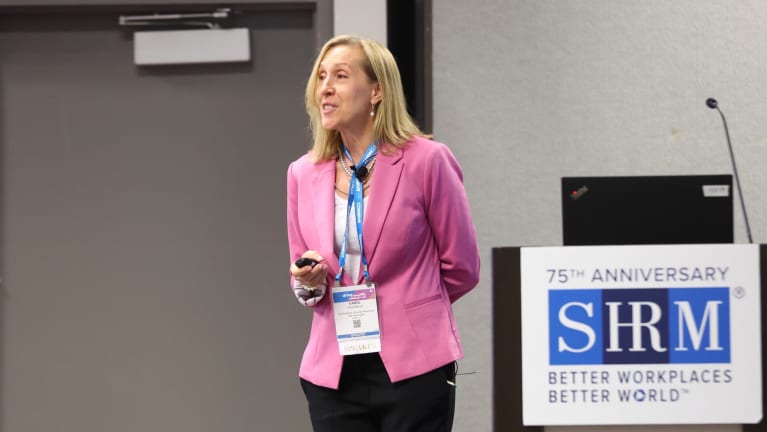

?The artificial intelligence tsunami is coming, and HR professionals are worried about two key things—how will it affect their organizations, and how will it affect their careers.
Over the past six months, it’s become clear that AI—and, specifically, AI’s best-known iteration, ChatGPT—isn’t likely to replace many HR professionals. But HR professionals who understand and use AI and ChatGPT are likely to replace HR professionals who don’t.
“ChatGPT can help us, as HR practitioners, to be knowledgeable, to be nimble and to have a seat at the table,” said Carol Kiburz, vice president of HR for Halff Associates, an engineering firm based in Dallas, during her June 13 concurrent session, “ChatGPT: Disruptor or Enabler?” at the SHRM Annual Conference & Expo 2023 in Las Vegas. “This is an opportunity, and if you can start using ChatGPT in a way you feel comfortable, you can be seen as a leader of thought.”
ChatGPT is one of the revolutionary new generative AI chatbots—along with Google’s Bard and Microsoft’s Bing AI—that can help HR professionals with many tasks, from writing job descriptions to sourcing vendors to conducting market research on compensation. It is the fastest-growing technology ever, collecting one million users in its first five days last winter.
This technology does have its drawbacks that HR must be aware of. It generates content by scraping the internet, so responses can be littered with errors. Yet those mistakes are still delivered in a confident format by the program. And, unlike a Google search, it doesn’t show you the source of the information.
Kiburz has started asking her HR team to experiment with ways to use ChatGPT to make her HR department more efficient. “We’re using it to create policies. We’re using it to create employee guides and more,” she said.
Other HR professionals and company leaders at the session shared their stories about diving into the ChatGPT waters—some deeper than others. Three examples:
‘I Use ChatGPT All Day Long.’
Jeffrey Harrington, deputy director at the Alliance for Workforce Development in Chico, Calif., was an early adopter, incorporating ChatGPT into his workflow when it launched last December. Today he uses it regularly for everything from crafting emails to writing training programs.
“I use ChatGPT all day long. Just the other day I wrote an employee conduct letter and tossed it into ChatGPT. It took all my language and made it sound much more positive,” Harrington said. “I had spent 45 minutes writing that letter, and the GPT version was way better than what I wrote.”
However, Harrington said it’s important not to use ChatGPT in a cut-and-paste manner. The results require customizing to your organization and weeding out incorrect (or legally dangerous) information.
“I totally get that it can be scary. And if you use it wrong or solely rely on it, that’s not good. If you just take 100 percent of what you get back and you don’t have the experience or knowledge to say, ‘That content is weird or off,’ then it’s going to be a mess,” Harrington said. “I think it’s just as scary as the internet. People thought the internet was going to ruin the world. Sure, it’s ruined some things, but it’s changed the world for positive exponentially more.”
‘Why Stick With a Candle If You Can Have Electricity?’
“ChatGPT is the next step, so it’s not if, but it’s when and how HR needs to navigate this,” said Amanda Abbott Knox, HR leader at Accumen, Inc., a health care consulting firm based in Phoenix. “Right now, there are limitations and things we should be cautious about, but why stick with a candle if you can have electricity?”
Knox says one of her key roles now is to teach the company’s leadership team about AI and how to better understand its potential. “I help them come up with ideas and projects to experiment with this technology so they become comfortable with it,” Knox said.
Some company leaders are skeptical of jumping on the AI train. Knox gave the example of a young employee who used ChatGPT to create a marketing report.
“Someone like me is going to say that’s like researching on the internet. But I can think of leaders who say, ‘No, that’s not genuine work, and the employee is being artificial by presenting that information.’ So those leaders are going to want to set some guardrails around that technology.”
For that reason, Knox is now working to craft a company policy for employees’ use of ChatGPT and other generative AI technologies.
‘How Are We Going to Manage the Transition?’
“It’s unusual and it’s new but I want to embrace the change,” said Patrick Sterling, the HR director at Seprod, a food distribution company in Kingston, Jamaica. “This is a change that HR should embrace and get more knowledge about because it can be so beneficial. Now I need to take it back to my office and get them on board.”
Experts acknowledge that the growth of ChatGPT will disrupt many industries and even replace some jobs. That means HR departments will be at the forefront of another workforce shift.
“My concern is about the people who are going to be impacted by this technology,” Sterling said. “How are we going to manage the transition and that whole change process? That’s something we’ll be dealing with for a while.”

